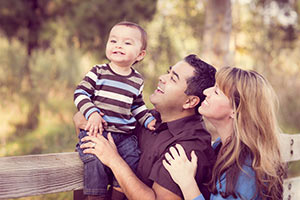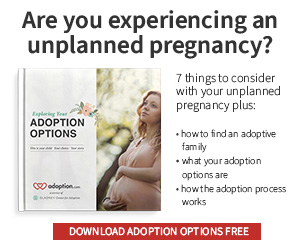ADOPTION IN
Connecticut

Adoption in Connecticut is an option for those considering placing a baby for adoption or adopting a child into their own family. One of your first steps in pursuing adoption in Connecticut will be partnering with an adoption agency that has your best interest at heart. Connecticut adoption is an option if you are facing an unplanned pregnancy or looking to build a forever family.
Adoption Near Me
Looking for more resources in Connecticut? Check out the Adoption Directory for a listing of adoption professionals in Connecticut.

Considering Placing Your Baby or Child for Adoption? You can learn more here or call an adoption counselor 1-800-236-7898.
Domestic Infant Adoptions can be completed through private adoption attorneys or adoption agencies to help them adopt a child domestically. Click here for a directory of Connecticut’s adoption service providers.
International Adoptions must be completed through private adoption attorneys or adoption agencies to help them adopt a child internationally. Find an international adoption service provider here.
Foster Care Adoptions in Connecticut can be completed by the Connecticut Department of Children and Families (800-842-6347).
Gallery of children waiting to be adopted.
Join the New England adoption group in our community!
I’m considering placing my baby or child for adoption.
Pregnant and have questions? We can help answer your questions by telling us what works best for you.
Are you pregnant and considering adoption? Do you need help getting started?
Click here and help us understand what your needs are and the preferences you have. We can help you get started.
Adoption in Connecticut
By: Julianna Mendelsohn
If you live in Connecticut and are considering adoption as a means to grow your family, you may be wondering if there is anything unique or anything specific you should know about adoption in CT before you take the plunge. Adoption laws and requirements vary from state to state. Let’s take a look at what adoption in CT entails.
There are certain laws establishing requirements for adoption in CT, which include the following:
– Criminal records check
– Home safety checks
– Medical examination: the health of the adoptive parents should “not present a hazard” to the children
– References
– Completion of a home study
– Adoptive families should have income “sufficient to meet the needs of their family,” including any child or children they intend to adopt
Connecticut’s law does not specify whether a potential adoptive parent must rent or own their own home and does not discriminate regarding marital status. This means single prospective adoptive parents or adoptive parents who are not legally married can pursue adoption in CT. Additionally, there are no restrictions on members of the LGBTQ community adopting.
These are the requirements you must satisfy to pursue adoption in CT. These requirements are very similar to requirements in most states. The home study is an area where many new prospective adoptive parents find themselves facing some fear. They worry that having a home that looks like anything other than a picture from a catalog is going to disqualify them from adopting, but this isn’t the case in Connecticut or anywhere else. The home study simply exists to make sure your home is safe, and also to help the social worker get to know you and your family better so they can help you in deciding what type of adoption to pursue, what kinds of children would do well in your home, what special needs you would be willing or able to accommodate, and how many children you could consider adopting at once. If you are adopting through the foster care system, for example, there is a good chance—if you are open to it—that you could end up adopting a sibling group. The social worker will ask you and your family members questions to help get to know you better and understand your family dynamic. Your home study social worker should be looked at as your ally in this process, not the enemy. They want to see you adopt successfully and are not going to disqualify you on a whim. In fact, they can be a great source of support and knowledge throughout your adoption process.
In Connecticut, the specific information your social worker will collect during the home study will most likely include these things:
– Your motivation to adopt
– Physical description and social background of each family member (including children)
– Evaluation of parenting practices or, if you are not currently a parent, what types of practices you think you will adhere to such as how you would discipline a child
– Summary of each family member’s health history and current condition
– Informal assessment of each family member’s emotional and mental health
– Evaluation of the understanding of and adjustment to adoptive parenting
– Evaluation of the prospective adoptive parents’ finances and occupations
– Description of the home and community
– Statements regarding the results of criminal records and child abuse and neglect registry checks
– At least three character references
In addition to the interview portion of the home study, which takes place in your home, you will have to pass a background check. A background check is required for anyone in your home over the age of 18, including children, relatives, or renters. For the background check, you will have to have a series of fingerprints taken. These fingerprints are then checked against the national, state, and local databases to ensure you have not committed any crimes that might make you an unsafe choice as an adoptive parent. The types of crimes that tend to disqualify individuals are felonies, particularly violent crimes, or crimes involving children.
So, once you have satisfied the requirements for adoption in CT, completed the adoption process, and been matched with a child, you then have to think about what adoption laws in Connecticut are like. Again, every state is different in regards to how the adoption process unfolds once you have been matched with a child. Consider the revocation period where the birth parents can legally change their mind about placing their child for adoption. Often, when parental rights are willingly signed away, there is a period of time when the termination can be reversed. In Connecticut paperwork cannot be signed any sooner than 48 hours after birth.
Before an adoption is finalized, birth parents can reverse the termination; however, the court will only entertain their case if it can be proven to be in the best interest of the child to return them to their birth family. Different judges may handle this situation differently. It is relatively rare that adoption is overturned unless it can be proven that for one reason or another the adoptive parents are not fit to parent any child.
Once you have been placed with a child, and the revocation period has expired, you can begin to think about finalization. Finalization is the legal process that completes an adoption. There are no specific requirements for adoption in CT regarding post-placement visits, and often, the adoption is finalized by the judge at the hearing for the termination of parental rights After finalization, adoptive parents will have the same legal rights regarding their child as they would for a biological child. After finalization, a birth certificate can be issued which adoptive parents can use to then obtain a Social Security Number for the child. It is recommended for all adoptive parents to obtain a new Social Security Number for their child. This birth certificate will list the adoptive parents and the full name of the child as chosen by the adoptive parents. At birth, an original birth certificate was created that contains the names of the birth parents and the name they may have chosen for the child. After the adoption is finalized, this original birth certificate is sealed, and to obtain it, the adoptee would have to obtain a court order once they have reached the age of 18. An adult adoptee in a closed adoption can receive records from the placement agency that describe some basic characteristics of their birth parents with identifying information redacted. If an adoptee expresses interest in connecting with the birth family, the placement agency is required to attempt to locate and contact the birth family to see if they consent to the release of their information.
Examining the requirements and laws for adoption in CT, it appears the requirements and laws are fair and balanced which gives both birth parents and adoptive parents reasonable treatment. The home study and preadoption requirements are fairly consistent with other states and adoptions can be finalized rather quickly, which is in the adoptive parents’ best interest. Overall, Connecticut should be seen as a relatively adoption-friendly state. If you are interested in adoption in CT, your first step would be to decide if you wish to adopt privately (through an agency or attorney) or through foster care. Whatever type of adoption you pursue in CT, you must work with adoption professionals who are well-versed in CT adoption law and have a good track record of completing adoptions efficiently and ethically.
Connecticut Adoption Guide
The information contained on this website is for educational purposes only and is not intended to be a substitute for professional legal advice. Always seek the advice of a licensed and qualified professional. While the content of this website is frequently updated, information changes rapidly and therefore, some information may be out of date, and/or contain inaccuracies, omissions or typographical errors.
Can I Adopt in Connecticut?
Applicants must be at least 21 years old. The home must be a stable environment, and the parents must make enough money to support a family. Parents can own or rent, but there must be at least 2 bedrooms in the home. Applicants must be willing to pass a background check, attend a 10 week training session if fostering, and complete a homestudy.
What Adoption Regulations Exist in Connecticut?
Advertising: Any birth parent may advertise in Connecticut using any type of media for the placement of his/her child for the purposes of adoption. Any hopeful adoptive parent may advertise in Connecticut using any type of media for placement of a child in his/her care for the purposes of adoption.
Any person who permanently transfers the legal or physical custody of a child younger than 16 for money or any item of value, or any person who accepts a child younger than 16 in exchange for money or any item of value, shall be guilty of a felony.
Relinquishment: Consent cannot be given until 48 hours after the birth of the child. Parents can file a motion with the court to set aside termination of parental rights at any time before the final decree of adoption in court.
Birth parent expenses: Counseling expenses within 72 hours of birth, living expenses not to exceed $1,500, and reasonable telephone charges/maternity clothing expenses.
Post-adoption contact agreements: Contact agreements in the state of Connecticut are legally enforceable.
Birth father rights: There is a paternity registry for fathers in Connecticut. Fathers wishing to take part in adoption proceedings can, at any time (but no later than 60 days after receiving notice of adoption proceedings), file a claim of paternity on forms provided by the district court where the mother resides.
Finalization: Out of 482 adoptions in 2014 the average time between termination of parental rights and adoption finalization was 10.4 months (acf.hhs.gov).
Is Adoption Assistance Available in Connecticut?
Can I adopt a Child from another country?
It is always possible to adopt a child from another country, even if you live in the U.S. In Connecticut, readoption (the process by which a U.S. state court issues a final adoption decree separate from a foreign adoption decree stating that the child has been legally adopted according to the laws of a particular state) is an option, but not a requirement.
However, only when the readoption or validation of a foreign adoption decree occurs can the child receive a U.S. birth certificate (ChildWelfare.gov). For more information on how to adopt a child internationally, be sure to contact your local adoption agency.
State Contacts
Gallery of children waiting to be adopted: https://adoption.com/photolisting?page=1&search_type=region&range=UnitedStates
State subsidy contact person:
Sarah Gibson
Deanna McIntosh
Jacqueline Watford
Department of Children and Families (DCF)
Office of Children and Youth in Placement
505 Hudson Street
Hartford, CT 06105
860-550-6593 (Jacqueline Watford)
Sarah.Gibson@ct.gov
Deanna.mcintosh@ct.gov
Summary
Adoptions in Connecticut can be completed by the Connecticut Department of Children and Families.
Applicants must be at least 21 years old. Parents can own or rent. There must be at least 2 bedrooms in the home. Applicants must pass a background check, attend a 10 week training session, and complete a homestudy.
Birth parents may advertise for the placement of their child for the purposes of adoption. Hopeful adoptive parents may advertise for placement of a child in their care for the purposes of adoption.
Consent cannot be given until 48 hours after birth. Parents can revoke consent any time before the final adoption decree.
The following expenses are permitted: counseling, living, telephone charges, and maternity clothing expenses. Contact agreements are legally enforceable. There is a paternity registry for unmarried fathers in Connecticut.
The average time between TPR and adoption finalization in 2014 was 10.4 months.










